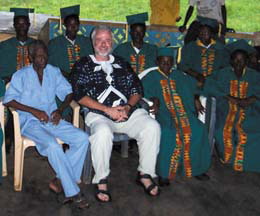| Solving the college mystery | Entrepreneurs extraordinaire | Ivy League Maverick |
| Home Forethought Campus Buzz Feature Stories Re:Search The Score Alum News Yesteryear | ||
What began as a bioecological research trip to Africa in 2001 turned into a life-changing venture for many Ghanaian children—and for Craig Powell.
 |
| Craig Powell at the school he helped build in Ghana. |
The director of the UT Arlington Environmental Health and Safety Office accompanied two biologists to Ghana to study community-based wildlife, his second career. Their lodgings resembled rustic bed and breakfast inns, many without running water or electricity.
In the village of Abrafo, he observed children walking around, seemingly with no purpose. It piqued his interest. A guide told him that many of the children became orphans when their parents died from AIDS.
Powell later learned that the Gyinahs, the family that owned the local inn, were trying to start a school for these children. Before leaving the country, he gave them some money. The kindness touched Agatha Gyinah.
"I am praying for your help with the school," she told him.
After he returned to the United States, Powell couldn’t forget the children and their needs. He began sending books, but most of the packages never arrived.
"If you would have told me four years ago that I would help establish a school in Africa, I wouldn’t have believed you," he says today. "I’ve never done anything like this before and didn’t have any plans to do it, either."
After trying unsuccessfully to help fund the school, he looked elsewhere for financial assistance. A friend told him that Pier 1 Imports awards grants to worthy causes. So he made an appeal and received a $5,000 grant. He credits his friend John Baker and Pier 1 CEO Marvin Girouard for getting the grant approved.
The funding has provided the Natilla School Complex with two buildings, each housing four classrooms, and a canteen to serve meals to the students. Construction on bathrooms is expected to begin soon.
"The water closet facilities are a necessity to provide proper hygiene for the students, faculty and staff," Powell said. "The existing facility is an outhouse on a portion of the school ground said to be favored by snakes."
Powell has established a relationship with a nongovernmental organization, A Rocha Ghana, to further assist the school. The NGO’s message is that conservation is a moral responsibility. He has also received help from colleagues and friends, among them Alusine Jalloh, a UT Arlington history associate professor and director of the Africa Program.
"To see an American with such an interest in an African school is rare," Dr. Jalloh said. "It is important to understand that education is the only way out of poverty for the African people."
With each visit to Ghana, Powell sees the impact that education can make. "Education is the future of that country. It’s like dropping a pebble in a pond and seeing the ripples expand outward."
The Natilla School Complex is a private school. Parents make financial sacrifices to send their children. That sometimes means choosing which child goes to school and which one stays home.
Before the Ghanaian school experience, Powell doubted that one person’s efforts could be meaningful. Now he sees things differently.
"You can make a difference—it just takes one person pulling others
along."
— Kim Pewitt-Jones
| Archives
| Alumni Association |
Giving to UTA | UTA
Home Copyright © 2005 UTA Magazine. All rights reserved. |
